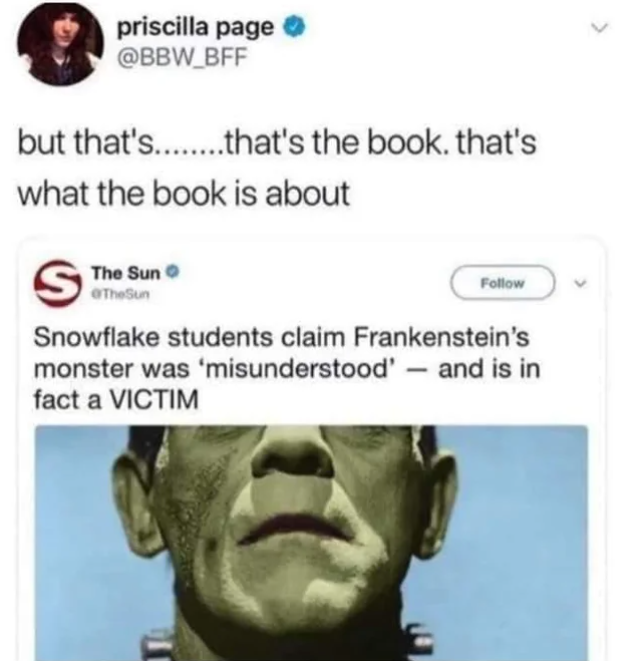this post was submitted on 28 Sep 2025
824 points (98.7% liked)
Facepalm
3399 readers
146 users here now
founded 2 years ago
MODERATORS
you are viewing a single comment's thread
view the rest of the comments
view the rest of the comments

I think too many are equating being a victim with being innocent.
There are two kinds of people in the world, abusers and victims, with no overlap or nuance whatsoever /s
What's the worst thing done to the monster, in your opinion?
If you really want an answer, I think we need to start early...
The monster is naive, curious, and good natured at the beginning. Delighted by fire, choosing to touch it - and then feeling pain. No one there to teach right and wrong, or even safe and dangerous. Just a naive child in a grown up body.
He finds a small hovel, and lives there observing. Taking food from them to keep himself fed, later discovering - because no one taught otherwise - that taking from others hurts those people. He doesnt want them to be hurt by him though, so he eats berries and nuts. I think this shows he is good natured, not wanting to hurt others.
Then we have his first interaction with the village. Some run, but others attacked him with stones and other weapons. He even commented not only that he was physically hurt, but seriously hurt by them (I think "grievously bruised" is the right quote).
He hid in a place so far removed from the village that the cottages seemed like palaces in comparison. He understands he looks different than others, but didnt understand how his looks would make him not just shunned, but hated. The villagers based everything on how he looked, and now this naive and good natured being had a direct look at just absolute cruelty.
Skipping ahead, the final part that makes him turn to being cruel himself is being told he will be alone, always.
At this point he hasn't experienced kindness from others, just cruelty. The neglect, the hopelessness, the physical pain from being attacked - this is the only expression towards others he experienced himself.
So the abused becomes an abuser. He takes out the pain and anger on others, showing them the pain he felt. He knew only pain and being alone, and his rage at his creator made him want his creator to feel the same.
I'd say its a pretty obvious tale of victim becoming the perpetrator.
The worst people in real life have both an abused background and an organic brain/genetic problem.
The monster's abnormal reaction to rejection (becoming a serial killer), I read that as he's probably got a bad brain/nature too. And why wouldn't he, given how he was made?
Generically speaking, nurture is the common thread. In this book, and in my experience.
I can't get behind blaming genetics/nature for people being good/bad. All that reminds me of is phrenology.
Right, and that fits with what the profs are saying here: that modern sensibilities view monsters (even serial killers) as victims.
Yes, because its accurate.
Dahmer was a horrifying killer. He also had a functionally absentee father, and his mother was self-medicating to deal with her mental health issues and developed a substance abuse issue. He was left alone at home for long periods of time, making him both physically and socially isolated. His biggest connection with his dad was being interested in the anatomy of dead animals, and his dad showed him.how to bleach bones and overall encouraged it - but not really engaging further. In school his behavior was considered bizarre, heavily attentions seeking, began drinking in high school, etc...
Everyone around him failed him in some way, and he became an absolute monster.
It doesnt change the fact that he did horrible things. It doesnt mean he didnt become a monster.
Recognizing that trauma led to that, though, is a good thing. It means we can better identify, understand, and address earlier.
If we reworked the monsters experience, Frankensteins engagement with him, how he was presented to the townspeople and how they reacted to him, would he have turned out differently? I would say yes. And I think its important for us to recognize that.
Yes, Dahner is probably a good example of what I'm talking about: the conjunction of mistreatment and organic brain disorders. His parents denied scientists at Fresno permission to examine his brain before cremation, so we can't be sure exactly what was wrong with him, but we know he was an alcoholic and the son of a mentally ill mother.
Charles Whitman is another: beaten by his father, lost his brother to murder, plus a tumour on his amygdala.
The point the English professors are making is that the new generation of students see monsters entirely as victims of circumstances. It's an ideological belief.
No, thats the point the Sun (a shit rag of a paper) was trying to get you to think. The professor who made the comment the Sun abused to make a shitty tweet said that students consider it more a creature than a monster, and how it shaped his teaching, and he himself sees the novel as a question of sentience and medical ethics.
No.